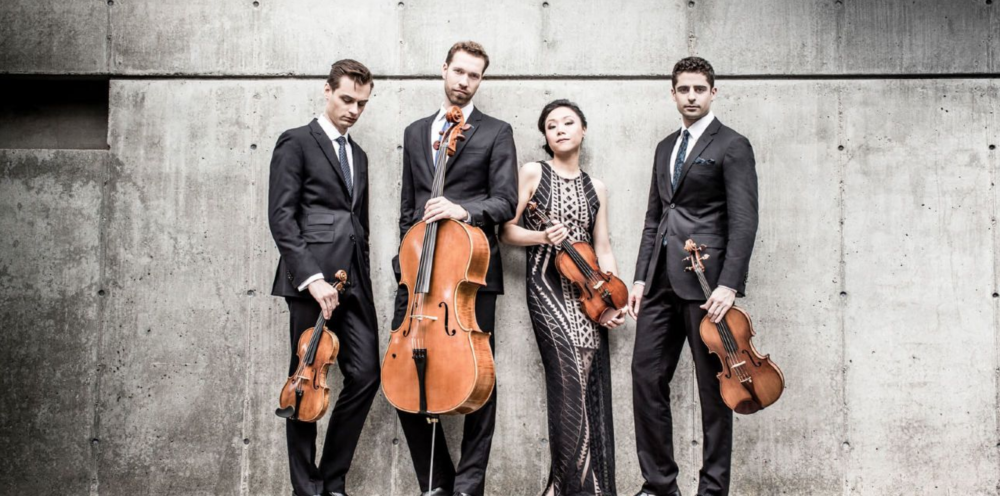
Tesla Quartet. (Photo courtesy of CU Presents)
The Tesla Quartet returned to the University of Colorado Boulder’s Grusin Hall with vigorous, youthful energy Sunday afternoon. They shined with their passionate, animated modern repertoire, including compositions by Pavel Karmanov and Michael Ippolito. Towards the end of the evening, the group became withdrawn and serious with their Tchaikovsky finale.
Previously CU’s graduate string quartet-in-residence, the Tesla Quartet studied under the Takacs Quartet from 2009 to 2012. Sunday’s concert marked their second performance at CU since their graduation. Takacs’ musical influence is readily apparent in the Tesla Quartet’s dramatic interpretations, which included grand flourishes of their bows and energetic swaying. Notably, cellist Serafim Smigelskiy brought vitality to the stage. Bobbing back and forth and grinning happily to himself, he emanated joy as he plucked and bowed effortlessly.
The quartet’s clashing, vibrantly patterned clothes created a distracting flurry onstage. Violinist Michelle Lie wore a black dress with striped white trim, a floral pattern of lemony yellow and cerise flowers winding around her torso. The male members of the quartet wore sleek black pants and dress shoes, contrasted by colorful printed shirts, from plum-colored flowers to abstract colorless geometric shapes. The resulting eclectic mix seemed purposefully free and chaotic.
The Tesla Quartet focused the first half on theme and variations, featuring “Variations on a Russian Theme,” Ippolito’s “String Quartet No. 3 Songlines” and Karmanov’s “String quaREtet.” Violinist Ross Synder humorously described the Russian folksong that inspired “Variations on a Russian Theme,” earning a laugh from the audience. In the song, a pining woman greets her long-awaited lover with harsh words, ironically chasing him away again. The ensuing piece showcased the quartet’s playfulness, alternating between plucked bouncy gestures and lyrical, pastoral melodies.
Ippolito’s “String Quartet No. 3 Songlines” challenged the musical ear, oscillating between crescendoing buzzing and stressful atonal melodies. Ippolito, the assistant professor of composition at Texas State University, is the winner of Tesla Quartet’s 2019 Call For Scores Competition. The song’s inspiration comes from the Australian Aborigine’s use of music instead of maps to find directions in the desert. The piece wandered and felt programmatic, more like a film score of an epic drama than a stand-alone composition.
Karmanov’s “String quaREtet” was the highlight of the performance. The clever minimalist piece built from simple plucked notes to intricate, flowing melodies, creates a “hypnotic effect” as Smigelskiy described it. Several audience members bobbed their heads, with one man tapping on his faded blue jeans to the continuous groove. The steady polyphonic texture mesmerized, comforting in its repetition, yet interesting in its moving transformations.
The Tesla Quartet of the second half seemed restrained. For the first three movements of Tchaikovsky’s “String Quartet No. 1, Op. 11,” the two violinists Lie and Synder and violist Edwin Kaplan barely moved, though cellist Smigelskiy continued his happy bobbing. As if waking from a Tchaikovsky-induced haze, the quartet became animated again for the final movement “Finale Allegro Giusto,” finishing with a last-minute energetic revival.
Contact CU Independent Assistant Arts Editor Isabella Fincher at isabella.fincher@colorado.edu.
